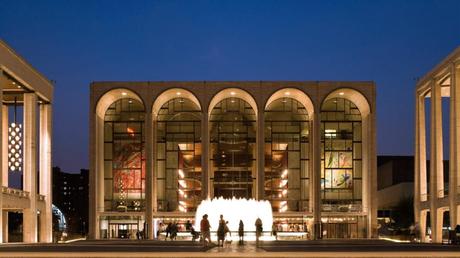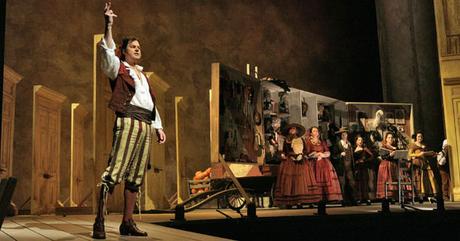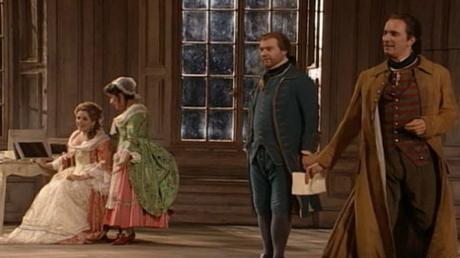 The Metropolitan Opera House at Lincoln Center for the Performing Arts
The Metropolitan Opera House at Lincoln Center for the Performing Arts
As the old saying goes, "We've come a long way, baby." But, then, so has the opera.
It's true that opera has gone about as far as a performing art could go - that is, along the compositional front. But how much further must it travel before it can achieve a rebirth in the face of the continuing coronavirus pandemic? No one really knows.
Be that as it may, loyal fans of the genre were cheered to learn that the Metropolitan Opera will be back, in full force, come September 27, when the company reopens its doors to live performances. The scheduled work, the long-awaited premiere of jazz trumpeter and composer Terence Blanchard's Fire Shut Up in My Bones, based on New York Times journalist Clarence Blow's memoirs, will be co-directed by James Robinson and choreographer Camille A. Brown. Both artists were credited with the company's successful The Gershwin's Porgy and Bess run.
Okay, that's one down and about 21 other works to be revived and presented, not including a recital by Bulgarian soprano Sonya Yoncheva and a one-off of Verdi's Requiem Mass on the 20th anniversary of 9/11. Can the Met pull off such a Sisyphean task? Will it be forced, in the long run, to close up shop in the event of a mass outbreak? We'll have to wait and see.
Frankly, this overly-ambitious program, which boasts four Met Opera premieres, six new productions, and 16 repertory favorites, is not only aimed at economic survival, but has its mind set on placating subscribers as well as easing the public's fears about COVID (okay, we buy that). Will they be enough to ensure that all is right with Gotham's theaters? We're not so sure.
Hey, most of Europe has succeeded in revving up their stage output. Why can't Broadway do the same, or should we say Manhattan's West Side, where Lincoln Center for the Performing Arts happens to be located? Why, it's been a veritable ghost town since the shutdown took hold. Time to get things rolling again, right? Ka-tching, ka-tching, ka-tching go the coffers! People's livelihoods are at stake, so let's get those shows on the road.
But aren't we being a tad premature in our expectations? Aren't opera and theater companies taking enormous risks with their patrons' health and lives? With tempting fate beyond the perceived norms? That in moving too quickly, they'll be inviting the unwelcome Delta variant onto their stages? With another variant named Mu still waiting in the wings? Good points, all!
As a general rule, there are plenty of risks already, especially where opera is concerned. Many of them have to do with the ever-expanding repertoire: the range and styles of works offered, in a variety of foreign formats (poetic English to be included), and the nature and extent of the pieces themselves.
Then, there are the artists who bring opera to life: the singers, the conductors, the musicians, the chorus, the sets and costume designers, the carpenters and the scenarists, the digital display technicians and the other contrivances that old-timers (such as myself) have come to grapple with and, inevitably, accept as the means by which works are disseminated and deployed.
All this (and a whole lot more) requires not only talent but money - and plenty of it. What makes reviving the art form during a still-thriving pandemic such a necessity in trying times? Our collective sanity perhaps? Saving civilization and civility as we know them?
I like to think it has more to do with preserving our culture, our way of life, and of saying to oneself, "This is the natural order of things. As our lives go, so goes the artistic life."
And there's no business like show business!
The More We Watch, the More We Want
During this "stay at home" period, I've enjoyed tuning into Met Opera on Demand. For the home-bound crowd among us, we've been able to "catch up" with dozens upon dozens of major and minor works, all in the comfort of our living rooms - many of which we would never have had the opportunity to enjoy and learn about had it not been for this 24-hour service.
Yes, day in and day out, the Met, in its duty as the country's premier opera showcase, has allowed anyone and everyone, from non-subscribers and newbies to rabid fans, the unique opportunity to indulge themselves in past and near-present performances ranging from standard repertory items ( La Bohème, Carmen, Aida, Don Giovanni, Madama Butterfly, Tosca, Rigoletto, The Magic Flute, Die Walküre, Der Rosenkavalier) to out-and-out rarities ( Akhnaten, Agrippina, The Nose, War and Peace, Nixon in China, From the House of the Dead, Doctor Atomic, etc.).
Unfortunately, as with life itself, all good things must come to an end.
At the close of July 2021, the Met Opera ceased its temporary "no cost" streaming service and reverted to past paying form. Of course, you'll be able to access short previews of choice items. But the whole shebang? Well, that'll cost you. Mind you, I'm not upset. Just saddened that art - especially the operatic art - must give way to reality. And what is that reality? That opera is an extremely expensive proposition; that it comes with a heavy, and we do mean HEAVY price tag; and that it takes a tremendous amount of effort, sweat, guts, and sacrifice to make it come alive.
How I wish that weren't the case. This large, unwieldy, by turns frustrating and heartbreaking, yet always alluring and life-affirming, and, yes, quite irresistible force continues to wield its power over us. Its ability to fascinate and consume listeners, for as long as it's been around, continues to hold sway. Still captivating, still unnerving, but very much alive and thriving. The Energizer Bunny of Song. THAT'S opera!
Opera exerts a powerful hold on listeners. It speaks our language. No, not Italian, not French, not German, not Spanish or Russian, nor even Czech. Those are obvious features. But another language entirely, one that strikes at the very heart, the very soul, the very fiber of our being, like no spoken language we know of. It's both a musical idiom and a literary one, separate but always together. And acceptance of its cost is a vital aspect of operatic life, an unalterable component. The alternative is extinction, and that we cannot allow.
The chance to revisit old friends is worth the extra time and effort. The same goes for the unfamiliar. In that, I've come to accept this opportunity, vis-à-vis the ever-expanding repertoire, with open arms and a good deal of curiosity. Lots of hits and misses, though, which we'll get to in due course.
Keep in mind that opera is not just Mozart, Wagner, Verdi, and Puccini. There's a whole bunch of viable stuff out there, if one bothers to look for and listen to them. But it's never a bad start when you begin with the tried and the true.
Along those lines, I was encouraged recently by an addition to my listening habits of a Met Opera podcast called "Aria Code." Now THERE'S a perfectly tuned ad line if ever I heard one (wish I'd come up with that!).
This free streaming series, hosted by musician, performer, and singer Rhiannon Giddens, a native North Carolinian of note, is both a refreshing take on the subject of podcasts and an highly informative essay about, of all things, the opera. Guests have included sopranos Anna Netrebko and Nadine Sierra, tenors Javier Camarena and Vittorio Grigolo, German bass René Pape, and a slew of teachers, artists, writers, musicologists, and so forth, whose unquestioned expertise in the field takes one's breath away.
The purpose of the program is to breakdown well-known arias into their basic components by way of historical analysis and musical extracts, providing background, explanations, and contrast as well as personal reflections by singers associated with the aria's style. It's a beguilingly entertaining half hour of music and talk, the kind that inspires and elevates the subject in a friendly, non-condescendingly down-to-earth manner.
So with that, let's go on with the show!

The Barber of Seville (2007). Rossini's ever-popular The Barber of Seville, or to use its Italian title Il Barbiere di Siviglia (originally, Almaviva, ossia l'Unitil Precauzione - "or The Useless Precaution"), starring Swedish baritone Peter Mattei as Figaro, mezzo-soprano Joyce DiDonato as Rosina, Peruvian tenor Juan Diego Flórez as Count Almaviva, bass-baritone John Del Carlo as Dr. Bartolo, and Canadian bass-baritone John Relyea as Don Basilio, is always welcome in one's household.
This is the Met's current Bartlett Sher production, another of his deftly humorous yet slightly contemporary (one could say, off-kilter) take on a standard repertory piece. I remember an older one (from the early 1980s) with Marilyn Horne, Rockwell Blake, Pablo Elvira, Enzo Dara, and Ara Berberian. Ah, but those were the pre-supertitle days! About the only words that audiences back then were able to discern were Ms. Horne's "It's the list of last-week's laundry," which always drew hearty guffaws.
From the Live in HD performance of March 24, 2007, all the cast members shone in their parts. They'd better, or might as well get into another line of work. With that said, the oh-so-tall Mattei made for an involved, but understated Figaro. A good thing too, for things got out of hand soon enough. His singing was above complaint, especially after getting through his high-lying introductory cavatina. From there, Mattei and his capable cast sailed through with the proverbial flying colors. There were extra characters galore, including that lively bunch of hangers-on who encircled the barber's pushcart whenever he was within earshot.
Novelties and innovations abounded, especially in Mr. Sher's world, and this production was no exception. He managed to bring this old warhorse to sparkling life with enough fizz as to give "champagne" a new meaning. With the stratospheric Juan Diego Flórez in firm control as Count Almaviva, the vocal pyrotechnics were intact. And with that wily minx, Ms. DiDonato, there was much to admire. Both singers had a field day: he as the amorous Count, she as the ditzy, accident-prone, self-motivated Rosina - like a spider waiting to pounce on her unsuspecting prey. In this setting, the comic antics took center stage, a welcome treat for tired minds.
Rossini's opus was not the first incarnation of French author, the Marquis de Beaumarchais' play. That happened to be one by composer Giovanni Paisiello, which the Rossini version soon displaced. So beloved was the older Paisiello piece that Rossini was reluctant to use the original title. A substitute was hastily arranged: the above-mentioned Almaviva, or the Useless Precaution. It did not help that the lead artist, Spanish tenor Manuel García, the scion of a notable singing family, decided to incorporate one of his own songs into the Count's serenade. Despite this audacious act, the opera overcame a nearly disastrous premiere to become one of the public's favorites.
The plot, sans those pre-revolutionary rumblings, involves a rascally doctor (Bartolo) who wants to marry his young ward (Rosina) with the help of an avaricious music master (Basilio). A young nobleman (Almaviva) has amorous designs of his own, but wants the ward to love him for himself, not his money. To aid in his scheme, Almaviva enlists a jack-of-all-trades barber (Figaro) in a preposterous plot that forces Bartolo to see the error of his ways. In the end, all ends happily as the doctor consents to Rosina and the Count's marriage.
That first act ensemble and finale of this production led to one of the funniest and liveliest gatherings in many a decade. So many simultaneous back-and-forth double takes occurred, many of which would be lost if not for the closed captioning. And hilarious, indeed, was the late John Del Carlo's potently-voiced, rapid-fire delivery, and perfectly-timed Dr. Bartolo, especially his quarrelsome give-and-takes with sleep-deprived servant Ambrogio (actor Rob Besserer) and the constantly-sneezing maidservant Berta (mezzo Claudia Waite).
Maurizio Benini led the Met Orchestra and Chorus in this rollicking, good-time, good for a hearty laugh-or-two gala, surely one of the better Barbers in many a year. Honorable mentions go to Relyea's well-sung, over the top "Calumny" aria, and Juan Diego's last-act addition, to the same melody of Angelina's air in the same composer's La Cenerentola (Rossini's Mediterranean take on another Frenchman, Charles Perrault's classic Cinderella story).

Le Nozze di Figaro (1998). Otherwise known as The Marriage of Figaro, this Jonathan Miller production, circa November 11, 1998, boasted soprano Renée Fleming as the melancholy Countess, bass-baritone Bryn Terfel as the hard-pressed barber-turned-servant Figaro, mezzo Cecilia Bartoli as his crafty wife-to-be Susanna, baritone Dwayne Croft as an older, smoothly plotting Count, rising mezzo Susanne Mentzer as the highly-strung Cherubino, bass Paul Plishka as cantankerous Dr. Bartolo, mezzo Wendy White as the jilted maidservant Marcellina, tenor Heinz Zednik as a sniveling Don Basilio, bass Thomas Hammons as inebriated gardener Antonio (who, by the way, gives away too much of the secret goings-on in the Count's palace), and perky coloratura Danielle di Niese as his daughter Barbarina. James Levine led the Met Opera Orchestra and Chorus.
Well, to put it bluntly, I'm not as indulgent of Mozart's four-act masterwork as I was with Rossini's raucous take on the tale. Mozart's version was written before the popular Rossini piece - in fact, the Barber is the first in a trio of plays by Monsieur Beaumarchais, the second being La Folle Journée, ou Le Mariage de Figaro ("The Mad Day, or..."), with the third one entitled La Mère Coupable, or "The Guilty Mother." Still, I find Wolfgang and librettist Lorenzo da Ponte's magnum opus to be long, long, long in the hearing. A little too much of a good thing, if such were possible.
In this sequel, the formerly above-board Count has turned into a randy old shirt-chaser. He can't keep his aristocratic paws off Figaro's intended, Susanna, nor can he resist the endearing young charms of the frisky Barbarina (or any other damsel within his grasp). This sets up some winding machinations by the women, whereby Susanna and the Countess (the former Rosina) plan to teach the carousing Count a lesson he'll never forget, but in a less confrontational sense. Figaro, too, gets his "comeuppance," to a degree, but all is resolved in the end, thanks mostly to Mozart's love for his characters. While the buffo elements are intact, it's the composer's music and the way he suffuses his characters with nobility and purpose that remain the opera's saving graces.
That's not to say that I dislike the work. Quite the contrary. Le Nozze di Figaro, to give its Italian rendering, was one of the first pieces I studied while at Fordham University. Our teacher, Dr. Kurtz, lavished all-due praise on the opera, with good reason. To peak our interest, Professor Kurtz played the fine Carlo Maria Giulini recording on EMI/Angel, with a sterling cast headed by Giuseppe Taddei, Anna Moffo, Elizabeth Schwarzkopf, Fiorenza Cossotto, and Eberhard Wächter in the principal roles, as a superior example of Mozart singing and conducting. I buy that, but for me, at least, I'm afraid this work has its longueurs. In fact, it never seems to end. Just when you think you've reached the point of a scene, another one begins.
"Too many notes?" as Emperor Joseph II termed it. (Of course, he was referring to The Abduction from the Seraglio, but if the shoe fits...). Well, I'll leave it to viewers to make that determination. I've made my peace with the piece, so that settles that.
Meantime, the assembled roster frolicked in Miller's re-interpretation, which became a lot more than your typical drawing room farce. Ribald and obvious were more the themes. Bartoli's constant mugging for the cameras and lightning quick vibrato were distracting, to say the least, but her artistry managed to squeak through, nonetheless. She included a rarely heard "number" in one of her scenes, but otherwise this singer's mannered approach to everything remained a turnoff.
Ditto for Mr. Terfel. I was reminded of how well his acting chops were in 1998, and how little actual mugging he did. That's not the case today, where his constant eye-popping and leading with his chin get in the way of his portrayals. Lately, they have all tended to be cut from the same cloth, with little variation or follow through. Here, though, I found his Figaro to be a most pleasant diversion. The robustness of the voice impressed (more baritone than bass) and was of good quality. For once, Terfel lived up to the promise of his youth. "Bravo, Signor Figaro, ma bravo!"
Dwayne Croft, as the Count, was surprise casting. One tends to forget how burnished a sound the Cooperstown native once possessed and could muster. A dependable and durable artist, Mr. Croft was normally cast in supporting roles. But his star turn as Billy Budd, his sympathetic Sharpless in countless Butterfly assignments, and his Ping in the trio of Ping, Pang and Pong in Turandot, have enlivened many a dull proceeding of these works.
Tall and striking, Croft stood out from the crowd, especially once Ms. Fleming entered the picture. The soprano was in her element, but her blowsy way with the words made her sometimes droopy intonation of the Countess' marital woes a bit of a chore. One could sense the deep hurt she felt at her husband's betrayal, though, so similar in comparison to Fleming's heartwarming portrait of the Marschallin in Der Rosenkavalier. On the youth front, Ms. Mentzer's boyishly charming "little cherub" was another well-cast part, her pointedly supple mid-range conveying the inner cravings (and outer yearnings) of a horny, pubescent boy on the cusp of manhood. As a consequence, this gave believability to Act II's shenanigans and subsequent madcap finale.
Both Mr. Plishka and Ms. White huffed and puffed and gusted to their hearts' content, but their third act revelation that they are, in reality, Figaro's long-lost parents - a long-kept secret, so we were informed - brought down the house. I found that last act wrap-up, where the Count asks the Countess to forgive his less than debonair carousing, to be a letdown and far less moving than is the wont (it was a finely focused feature of Miloš Forman's Amadeus film project and of Peter Shaffer's stage play). Otherwise, I was more than happy to re-live this work, albeit in fast-forward fashion.
(End of Part Seven)
To be continued....
Copyright © 2021 by Josmar F. Lopes
